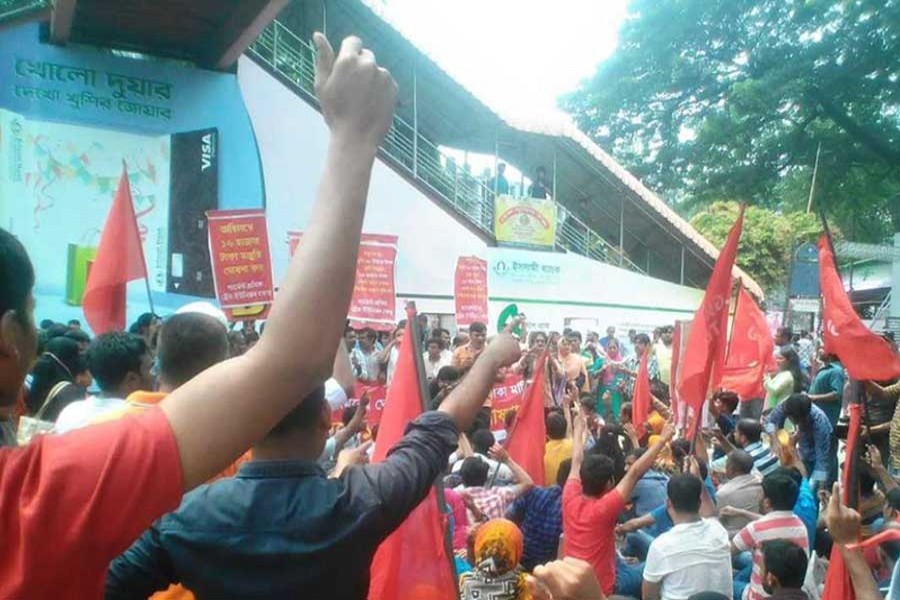The garment workers have rejected the minimum wage of Tk 8, 000 fixed by the government late last week. They are demanding raising it to Tk 16,000.
Under the banner of Garments Workers' Trade Union Centre, several hundred garment workers staged a sit-in in front of the National Press Club to press home their demand. They say setting the minimum wage at Tk 8,000 for readymade garments (RMG) workers is unjust and illogical. They called upon the government to reconsider the decision. They have announced programmes of demonstrations in industrial areas of the city.
When the country is graduating towards a middle-income one, they argued, workers' salary should be minimum Tk 16,000 considering the increasing prices of daily needs.
Bangladesh is the largest exporter of readymade garment products, after China. The sector employs an estimated 40 million workers, mostly women, and contributes to more than 80 per cent of Bangladesh's export earnings.
Unsafe working conditions and low wages have long been a concern in the garment industry. However, the country has come a long way since the 2013 Rana Plaza collapse, which killed 1,100 people - mostly RMG workers.
The workers' wages were last raised in 2013. This time, the government raised the entry-level salary to Tk 8000, up nearly 51 per cent from the existing pay. Prime Minister Sheikh Hasina had to intervene in the wage hike dispute between the owners and workers' representatives.
Owners' representatives proposed Tk 6,360 and stuck to Tk 7,000 while workers' representatives did not agree to bring down their proposal from Tk 12,020. The new minimum monthly wage included basic payment of Tk 4,100, which is currently Tk 3,000.
Defending the wage hike of the garment workers, the government says it will remain preoccupied with national election activities after October and might not pay attention to this issue. Usually, the wage board makes recommendations proposing the new wage structure to the labour ministry and the ministry announces the same through a gazette notification.
Despite having all the odds including rising cost of doing business and reduction in price of apparels, the trade body of the apparel sector, Bangladesh Garment Manufacturers and Employers Association (BGMEA), claimed that they had agreed with the PM's directive.
Since the last revision of RMG minimum wages, workers' living expenses have increased by 85 per cent, according to a survey. Non-food consumption of workers increased significantly compared to their expenses on food. It is highly logical that the minimum wage of the RMG workers should address the basic needs like housing, health and education expenses.
Analysing the cost of living of the RMG workers in Bangladesh, a Centre for Policy Dialogue (CPD) study had earlier proposed a grade-wise wage structure for the workers. It proposed to abolish the seventh grade in the wage structure and suggested minimum wage for the sixth grade to be Tk. 10,028 for workers with children and a family of two earning members.
There is, however, a need to work on motivating the workers by providing them share in the profit and thus, ensuring participation of the workers in the decision making process. The government should participate by keeping a separate social welfare budget. These are required to ensure distributive justice for the workers which will, in turn, increase their productivity.
The productivity of the workers can be increased if the health benefits are there alongside other benefits. There is no denying that the buyers are the most important stakeholders and should be involved in the wage fixing process through discussions with owners and workers.
Based on a survey in several areas, it was found that a family needs about Tk 16,000 to be able to meet all basic needs. Yet, whatever the amount of the minimum wage, it should be set through a negotiation between the workers' and the owners' representatives.
According to calculation, the workers' wages could be hiked by 20 per cent if there were no inflation. But between 2013 and 2018, the prices of essentials have gone up, which has reduced the purchasing power of workers. The rate of inflation has also registered a rise every year.
It is expected that the revised minimum wage rate will not only compensate for inflation but also raise workers' purchasing power. In short, their real wage should rise. The latest revision of minimum wage (from Tk 3,000 in 2010 to Tk 5,300 in 2013) was associated with a 37 per cent increase in real wage. In such a situation, in 2018 the workers should expect a minimum wage of Tk 9,725.
In order to estimate the minimum wage rate, however, one has to look at the poverty line income, which is required to maintain a minimum level of living standard. This approach is also called the cost of basic need approach.
The Household Income and Expenditure Survey 2016 said an individual requires a monthly income of Tk 2,268 to live just above the poverty line. Therefore, a four-member family, with only one income-earner, would require a monthly income of Tk 9,072 in 2016.
By considering 5.0 per cent inflation in the last two years, this wage according to the cost of basic needs should be Tk 10,152 in 2018. However, if there is more than one earner in the family, the required income to meet the cost of basic needs would be smaller.
Another criterion in setting the minimum wage rate could be to hike the wage rate by the same percentage as the increase in national income. The per capita real gross domestic product (GDP) and the per capita real gross national product (GNP) increased 31 per cent and 27 per cent respectively from 2013 to 2018, as per the latest national accounts statistics of the Bangladesh Bureau of Statistics (BBS).
In the circumstances, the leaders of the garment workers' unions may sit with the government for another round of talks for a modest hike in their just-announced minimum wages for future sustainability of the industry.


